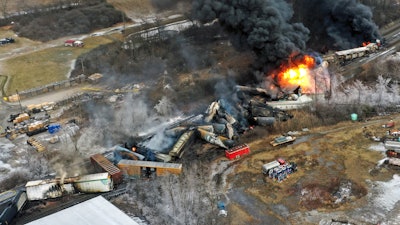
A federal judge on Wednesday approved a $600 million class-action settlement Wednesday that Norfolk Southern railroad offered to everyone who lived within 20 miles (32 kilometers) of last year's disastrous derailment in East Palestine, Ohio.
Judge Benita Pearson gave the deal final approval after a hearing where the lawyers who negotiated it with the railroad argued that residents overwhelmingly supported it, attorneys for the residents and railroad spokesperson Heather Garcia told The Associated Press. Roughly 55,000 claims were filed. Only 370 households and 47 businesses opted out.
Those who did object to the deal were vocal in their concerns that the settlement won't provide enough and that the deal was rushed through so quickly that they can't possibly know what the potential health impact from the derailment will be. They say it's hard to know all the risks, given the way test results have been reported by the EPA and the fact that the lawyers haven't disclosed everything they learned in their investigation.
The objectors had hoped the judge would order the plaintiff's lawyers to release the tests their own expert did after the derailment and address their concerns about a toxicologist who told them at one of the lawyers' town meetings that they shouldn't worry because he doesn't think anyone will develop cancer. That angered residents who have been complaining about unexplained ailments since the derailment and talking with doctors who are conducting studies to try and determine what the health impacts will be. Experts say it's too soon to know the health impacts.
“These attorneys were bullying people and telling them they were never going to get any money if they didn’t take this. People felt backed into a corner,” resident Jami Wallace said.
The judge's approval clears the way for payments to start going out quickly. The lawyers had previously said they hoped to get the first checks in the mail before the end of the year.
As part of the settlement, any aid residents received from the railroad will be deducted from their final payments. Wallace and others who had to relocate for an extended period while the railroad paid for hotels or rental homes likely won't get anything.
Anyone who lived within 2 miles (3.2 kilometers) of the derailment can get up to $70,000 per household for property damage plus up to $25,000 per person for health problems. The payments drop off the farther people lived from the derailment down to as little as a few hundred dollars at the outer edges.
“This outcome would not have been possible without the resilience and support of the East Palestine community and the broader class of impacted residents and business owners,” the plaintiffs’ attorneys said in a statement. “We look forward to beginning the distribution of funds in the coming weeks to help this community rebuild and move forward.”
When the train derailed late on Feb. 3, 2023, tank cars full of hazardous chemicals ruptured and spilled their contents that caught fire just outside the small town on the Ohio-Pennsylvania border. Then three days later officials decided to needlessly blow open five tank cars of vinyl chloride and burn the toxic plastic ingredient inside because they feared they would explode.
Since the derailment, the railroad has offered residents and the community $108 million in assistance and paid for the massive cleanup that has cost more than $1 billion.
“We made a promise to make things right and this is just one piece of that commitment," the railroad said in a statement. "We remain committed to this community for the long haul and look forward to continuing our relationship with the Village as we work to help the area recover and thrive.”
Tamara Lynn Freeze said she and her husband ultimately decided to accept the deal despite their concerns about giving up the right to ever sue even if someone eventually develops cancer. She said the idea of having to go it alone against the railroad's army of lawyers one day is daunting.
“It seems like everybody kind of just wanted it to be over with. like the attorneys and obviously Norfolk,” Freeze said.
She and her husband live in his childhood home, which is some 175 yards (160 meters) from the derailment site. They will now decide whether to give up that house that's paid for or find somewhere they can feel comfortable planting a garden and living their lives normally again.






















